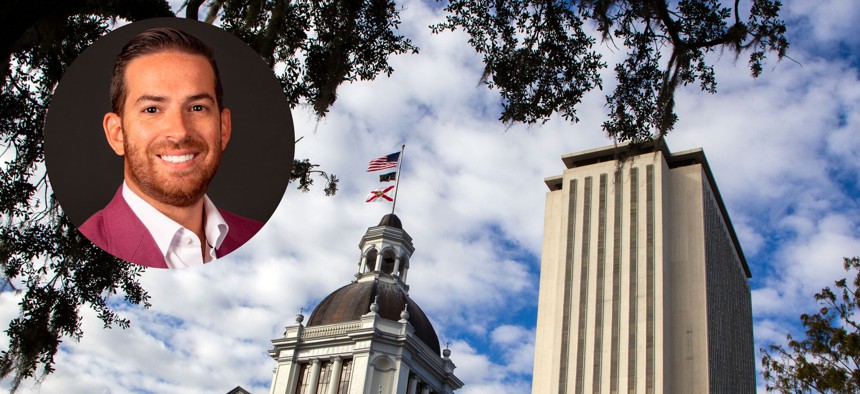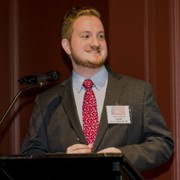Politics
Five things to know about future Florida House Speaker Daniel Perez
The Miami-Dade state representative will be formally designated for the top leadership position in a Monday morning ceremony.

Photo illustration by Anabel Dayao/City & State. Photos via Bascom Communications (Perez), Getty Images (state Capitol).
Today is a crowning moment for one of South Florida’s most influential political figures.
State Rep. Daniel Perez, a Miami-Dade Republican in District 116, will be formally designated as the next speaker of the Florida House of Representatives at a ceremony this morning at the Capitol.
He'll take over the role from current Speaker Paul Renner, R-Palm Coast, for 2024-26 after next November's election. His ascension assumes, of course, that he wins reelection next year and that the GOP maintains its majority in the chamber. Neither is in much doubt; Republicans now outnumber Democrats 83-35.
After a designation ceremony, speakers-designate have traditionally touched on policy interests they're likely to pursue when they take over the big chair. Renner, for instance, delivered on a promise to get passed a school voucher expansion in his first session as speaker earlier this year.
Going further back, former Speaker Richard Corcoran released an 86-page policy paper the day of his designation ceremony, calling for a new “legislative culture of purpose” and, among other things, an extension of the ban on lobbying by former lawmakers.
Of course, not all speakers-designate are able to accomplish what they set out to do – but that doesn't stop them from trying. With that in mind, here are five things to know about Florida’s next House speaker:
He has long ties to the community he represents
Originally born in New York, Perez moved to Florida with his family when he was six years old. He moved to Westchester, an affluent neighborhood in Miami-Dade.
Today, Perez still lives in and represents that community. First elected in a 2017 special election, the 36-year old is in his third consecutive full term representing the neighborhood he grew up in.
He and his wife Stephanie have two young children. He’s involved in other areas of his community, including serving on the Christopher Columbus High School Alumni Board and volunteering as a lector and CCD teacher at his Catholic church.
He's an attorney by trade
When he is not working in the Florida Legislature, Perez works as an attorney in the insurance industry. (Three of the last five House speakers, counting Renner, have been lawyers.)
After getting his undergraduate degree from Florida State University and his law degree from Loyola University, Perez spent two years with the Miami-based Downs Law Group and almost four with Cole, Scott & Kissane.
He now is in-house counsel for Doctors HealthCare Plans, a company that provides plans to Medicare recipients in Miami-Dade County.
He's a fundraising juggernaut who has yet to face a tough election challenge
In every race in his political career, Perez has either prevailed or faced no challenger.
The closest race he ever ran was his first, the 2017 special GOP primary election. He came out on top with an almost 10-point victory before winning the general election by over 30 points.
No other race has gotten within 15 points. No person in either major political party even filed to run against him in 2022.
This sustained dominance can in part be chalked up to his fundraising strength. In that 2022 unopposed race, he raised over $3.5 million across his campaign account and two political committees.
Primarily driven by donations from businesses and business-aligned groups from around the state, Perez continues the long tradition of incoming legislative leaders being flush with enough cash to make any challenge to them seemingly impossible.

His legislative accomplishments include Surfside related reforms, election overhaul
Following the tradition of incoming House leaders, Perez is chairing the Rules Committee in 2023 and 2024 before he becomes Speaker. This suggests he will not personally introduce or champion any bills.
Still, he has had his hand in significant legislation.
Perez took the lead in negotiations on changes to state condominium inspection regulations after the collapse of the Champlain Towers South building in Surfside in 2021. The 88-page bill signed by Gov. Ron DeSantis was negotiated by Perez and other lawmakers during the 2022 session, but ultimately needed until that year’s property insurance special session to pass.
He has also taken up priorities for DeSantis and Florida Republicans, including the 2022 election integrity legislation. The bill created the controversial Office of Election Crimes and Security within the Department of State, which has been dubbed the governor’s "election police force" by some critics.
And, as Florida Politics highlighted his 2023 legislative performance, "The Miami lawmaker is bringing back cash for school infrastructure, a new pilot program to tackle the lengthy waitlist at the Agency for Persons with Disabilities, and much-needed condo reforms."
He chairs a national conservative state legislative organization
Perez also is influential in conservative political circles outside of Florida.
He is currently the 2023 chair of the American Legislative Exchange Council (ALEC). While the organization claims to be non-partisan and working to connect state legislators from across the country, the group consists mostly of conservative lawmakers and unites them in supporting business-friendly or otherwise conservative-leaning legislation across the country.
Former U.S. House Speaker Newt Gingrich, who has spoken at events for ALEC, once called it “the most effective organization” at spreading conservatism and federalism to state lawmakers.
ALEC, which requires at least $12,000 annually for private sector members to join, hosts national conferences for state legislators and drafts model legislation for lawmakers to pass in their own states.
One of its more prominent issues: A model right to work law, in which a state bars unions from collecting fees from workers who are not union members.
Contact Tristan Wood at twood@cityandstatefl.com and follow him on Twitter: @TristanDWood.
NEXT STORY: FDLE: Miami city commissioner charged with money laundering, official misconduct and more
